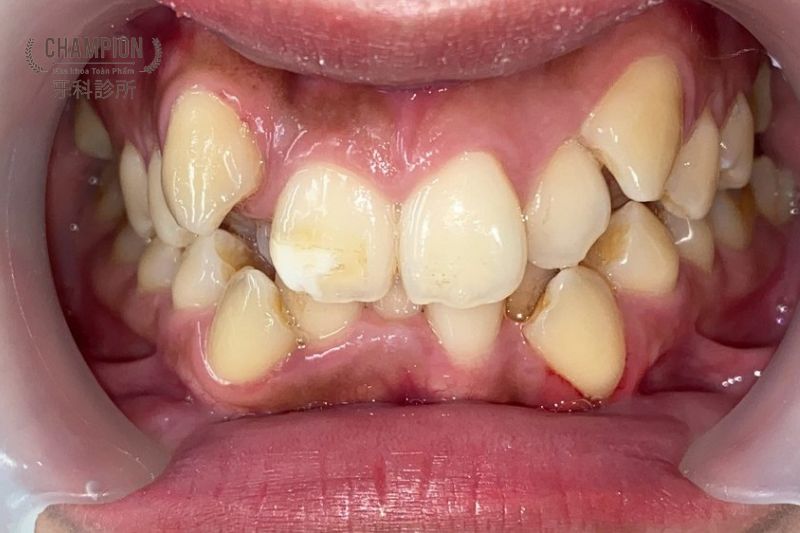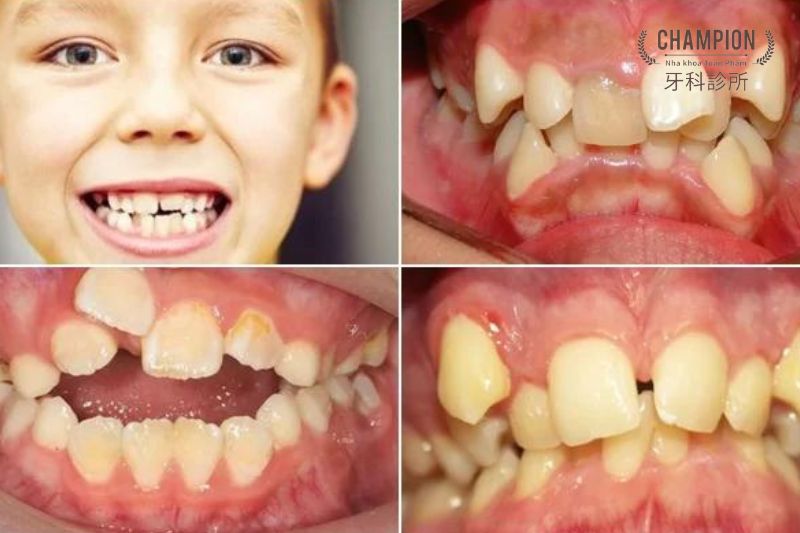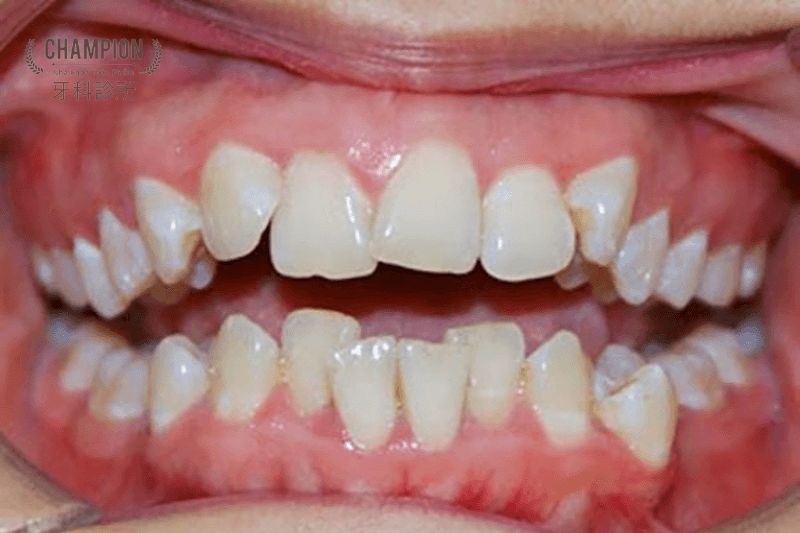Crooked teeth refer to a condition where teeth grow crowded, misaligned, or unevenly on the dental arch. This issue not only impacts the aesthetic appeal of one's smile but also poses various risks to oral health. So, what are the causes and how can this condition be addressed? Let's explore the following article from Champion Dental Clinic!
What is Crooked Teeth?
Crooked teeth are an undesirable condition where teeth do not align properly on the dental arch, resulting in misalignment and crowding. This can occur when teeth do not develop correctly or due to various factors, leading to the potential for crowding and unevenness in the dental arch.
Crooked teeth pose difficulties in chewing food and can impact the digestion process. Improper tooth alignment makes brushing and using dental floss more challenging, increasing the risk of oral health issues.

Major Causes of Crooked Teeth
Crooked teeth can be caused by several common factors, including:
Prolonged tooth loss
Long-term tooth loss is a primary factor contributing to crooked teeth. Missing teeth lead to a gradual reduction in chewing force, causing the jawbone to lose support and become susceptible to resorption. Remaining teeth may shift and tilt over time.
Wisdom teeth impact
Wisdom teeth often encounter issues when erupting due to insufficient space on the dental arch. They may grow crooked, horizontally, or even impacted beneath the gum line. The pressure from wisdom teeth can shift other teeth, causing misalignment.
Faulty or improperly maintained orthodontic appliances
Although orthodontic treatment, such as braces, is an effective method, incorrect implementation or failure to wear retainers properly can lead to teeth reverting to their original positions or becoming even more misaligned. These issues not only contribute to crooked teeth but can also affect chewing function, causing discomfort and increasing the risk of gum infections. Additionally, facial aesthetics may be impacted when the smile is uneven and less attractive.
The Prolonged Impact of Crooked Teeth
Crooked teeth, when left untreated for an extended period, can lead to significant health and aesthetic consequences for the patient. Below are some crucial ramifications:
Aesthetic Loss
Crooked teeth result in an uneven and unnatural smile, affecting facial aesthetics. Patients may experience a loss of confidence when interacting with others and might even avoid talking or smiling extensively. This reduced self-esteem can impact the quality of daily life.
Crowded or Gapped Teeth
Crooked teeth can cause the upper dental arch to widen, creating gaps between teeth and leading to crowding or gaps. These spaces provide an easy entry point for bacteria, leading to oral health issues such as cavities, gum inflammation, and periodontal disease.
Difficult Oral Hygiene
Misaligned teeth increase the presence of interdental spaces, making the cleaning process more challenging. Food particles can easily accumulate in hard-to-reach areas, creating conditions for bacterial growth. This can lead to cavities, gum inflammation, and other oral health problems.
Bite Misalignment
Crooked teeth not only affect aesthetics but also disrupt the natural bite alignment. With an imbalanced bite, chewing efficiency decreases, causing temporomandibular joint (TMJ) pain, chronic headaches, and neck muscle fatigue.
Digestive Disorders
Ineffective chewing due to crooked teeth can exert significant pressure on the stomach, leading to digestive problems. Improperly chewed food increases the risk of intestinal disorders and other digestive issues.

Methods to Address Crooked Teeth
To rectify crooked teeth, the treatment approach depends on the specific causes. Here are common solutions for two primary scenarios:
Crooked Teeth due to Wisdom Teeth
For cases where crooked teeth result from wisdom teeth, the common solution is wisdom tooth extraction. This procedure should be performed by experienced dental professionals in a sterile environment to prevent complications such as nerve damage, prolonged bleeding, or infection. Removing wisdom teeth helps alleviate pressure and prevents the shifting of other teeth, mitigating the risk of misalignment.
Crooked Teeth due to Long-term Tooth Loss
In cases of prolonged tooth loss, the most common solution is dental restoration. Currently, dental implants are considered an optimal choice due to their numerous benefits. The implant process involves embedding a titanium post into the jawbone, onto which a prosthetic tooth is attached. Dental implants restore chewing function, provide high aesthetics, and offer secure stability.
It's crucial to choose a dental clinic with experienced professionals. The implant process demands high technical skills and rigorous hygiene control to avoid infections. Seek expert opinions and patient reviews before deciding on a dental clinic for treatment.
For cases where teeth misalignment is mild: The use of retainers is often recommended by dentists. Retainers help maintain the new tooth positions after orthodontic treatment, preventing teeth from reverting to their original positions. Proper and regular retainer use is essential to stabilize treatment results and prevent relapse.
For severe or recurrent cases of crooked teeth: In situations of severe misalignment or relapse, a second round of orthodontic treatment, such as braces, may be necessary. This process should be undertaken by experienced dental professionals in a sterile environment to ensure that teeth move in the correct direction and avoid relapse.

>> See more: What to do when bad breath affects communication and oral health?
Considerations during Crooked Teeth Treatment
- Regular Scheduled Check-ups: Regular dental check-ups are crucial for monitoring the treatment process. Biannual check-ups help detect any abnormal tooth movement early, allowing for timely intervention to ensure stable and long-lasting treatment outcomes.
- Proper Retainer Use – Adequate Duration: Retainers play a vital role in maintaining the new tooth positions. Patients should adhere to wearing retainers for at least the first year after orthodontic treatment. While the duration may be reduced later on, consistent and adequate use is important to prevent relapse.
- Balanced and Nutrient-Rich Diet: Dietary choices directly impact treatment results. Limiting hard and sticky foods while favoring softer, more liquid diets reduces pressure on teeth and prevents severe misalignment. Supplementation with fruits, vegetables, dairy, and cheese provides essential nutrients for tooth and jawbone development.
- Correct Oral Hygiene Practices: Proper dental hygiene is essential to avoid gum inflammation, periodontal disease, and tooth loss. Using a soft-bristle toothbrush in combination with interdental brushes, dental floss, and mouthwash ensures effective plaque removal. Maintaining correct oral hygiene practices before, during, and after treatment is crucial.
In Conclusion
Crooked teeth go beyond cosmetic concerns, affecting gum health and bite function. Proper care and seeking assistance from dental experts are essential for preserving oral health and the beauty of a smile. Champion Dental Clinic takes pride in being a reputable oral healthcare provider, receiving positive reviews from satisfied customers. With a skilled and specialized team, Champion is committed to delivering the best oral care methods.
Vietnamese & English: (028) 5411-2295
中文: (028) 5411-2297 172 Nguyen Luong Bang, Tan Phu Ward, District 7, Ho Chi Minh City.
Fanpage: Champion Dental Clinic 牙科診所
Zalo: Champion Dental Clinic
Youtube: Champion Dental Clinic 牙科診所
 Champion Dental Clinic
Champion Dental Clinic



